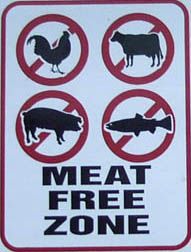GLOBALIZATION: It's what's for dinner
Global food movements making a difference: PLANT-BASED DIETS
"Eat less meat." That was the essence of the message by Dr. Rajendra Pacauri, chair of the United Nations Intergovernmental Panel on Climate Change in September. While the comments by this Nobel Peace Prize recipient may be "the most controversial yet," they represent one of the most practical things individuals can do to tackle global warming. [38] "In terms of immediacy of action and the feasibility of bringing about reductions in a short period of time, it clearly is the most attractive opportunity," Pacauri said. "Give up meat for one day [a week] initially, and decrease it from there."
 The comments by this vegetarian bear testimony to another global food movement - plant-based diets, which include Vegetarianism, Veganism, Raw/Live Foodism, and Fruitarianism. [39] Each has received increased attention as a sustainable dietary choice, which has health benefits personally and environmentally.
The comments by this vegetarian bear testimony to another global food movement - plant-based diets, which include Vegetarianism, Veganism, Raw/Live Foodism, and Fruitarianism. [39] Each has received increased attention as a sustainable dietary choice, which has health benefits personally and environmentally.Though the history of plant-based diets is a long one, John Robbins brought it to the forefront of the American conscious in 1987 with his book, Diet For A New America. Now an international bestseller, the book clearly presents how food choice affects personal health and happiness, but also the future of life on the earth. By detailing health risks of meat consumption, corruption in food production, and animal abuses in the food industry, he advocates for a plant-based, vegan diet, and has inspired many to eat less (if any) meat.
Robbins drew much attention to himself and to his first book as the only son of Irving Robbins of the Baskin-Robbins ice cream empire. Though groomed to follow in his father's footsteps, he chose to walk away from the company and the immense wealth it represented to "pursue the deeper American Dream. . . the dream of a society at peace with its conscience because it respects and lives in harmony with all life forms. A dream of a society that is truly healthy, practicing a wise and compassionate stewardship of a balanced ecosystem." [40] While Robbins really gave credibility to the growing vegan movement, he also re-started the vegetarian movement in the United States. [41]
The history of plant-based diets is really as old as history, and rooted in all religious and philosophical traditions. [42] In terms of human anatomy, some doctors are advancing the physiological facts that humanity was created as natural herbivores, not carnivores. [43] This is confirmed in the creation story of the Judeo-Christian faith where a plant-based diet is prescribed for humans and for animals in Genesis 1:29-30, with the harmonious co-existence of humanity and the environment being deemed by the Creator as "very good" (1:31).
Among religious groups in Egypt around 3200 BC, a vegetarian ideology was practiced with abstinence from flesh based upon karmic beliefs in reincarnation. Abstention from meat was also central to such early religions as Hinduism, Buddhism, Zoroasterianism, and Jainism, which all hold doctrines of non-violence and respect for all life forms. While wishing to avoid animal cruelty, philosopher and mathematician Pythagoras encouraged vegetarianism as a key factor in peaceful human co-existence, putting forward the view that slaughtering animals brutalized the human soul. He also saw the health advantages in a meat-free diet.
Other ancient Greek thinkers, Socrates, Plato, and Aristotle also favored a vegetarian diet and advocated a "natural" life that did not involve animal cruelty. Though such ideals found very limited sympathy within the brutality of Ancient Rome, vegetarianism spread throughout the Roman Empire from the 3rd to 6th centuries among those influenced by Neo-Platonist philosophy, a progression from the teachings of Plato.
In the east and in the west, history clearly reveals that plant-based diets have nourished and sustained cultures all over the world for thousands of years. However, Manchester, England in 1815 is often regarded as the birthplace of the current vegetarian movement. [44]
Next week:
History of the current vegetarian movement
[38] Juliette Jowit, "UN says eat less meat to curb global warming," Guadian.co.uk, http://www.guardian.co.uk/environment/2008/sep/07/food.foodanddrink (accessed September 20, 2008).
[39] Veganism, Raw/Live Foodism, and Fruitarianism share roots with the Vegetarian movement. Due to limited space, only the history of Vegetarianism will be presented in this paper. Each, however, like Vegetarianism, developed first in Europe before influencing the dietary choices of Americans.
[40] "About John Robbins," Food Revolution, http://www.foodrevolution.org/bio.htm (accessed December 17, 2008).
[41] Michael Bluejay, "A History of Vegetarianism," Vegetarian Guide, http://michaelbluejay.com/veg/history.html (accessed December 17, 2008).
[42] Portions of this history are from "21st Century Vegetarians - Through the Ages," The Vegetarian Society UK, http://www.vegsoc.org/news/2000/21cv/ages.html (accessed December 14, 2008),
[43] Milton Mills, "Are Humans Designed To Eat Meat?" (2007), VegSource http://www.vegsource.com/articles2/mills_07.htm (accessed December 17, 2008).
[44] "Shaker-makers! Manchester Originals," International Actuarial Association - Manchester, http://www.actuaries.org/ASTIN/Colloquia/Manchester/Manchester_Originals.pdf (accessed December 17, 2008).



No comments:
Post a Comment